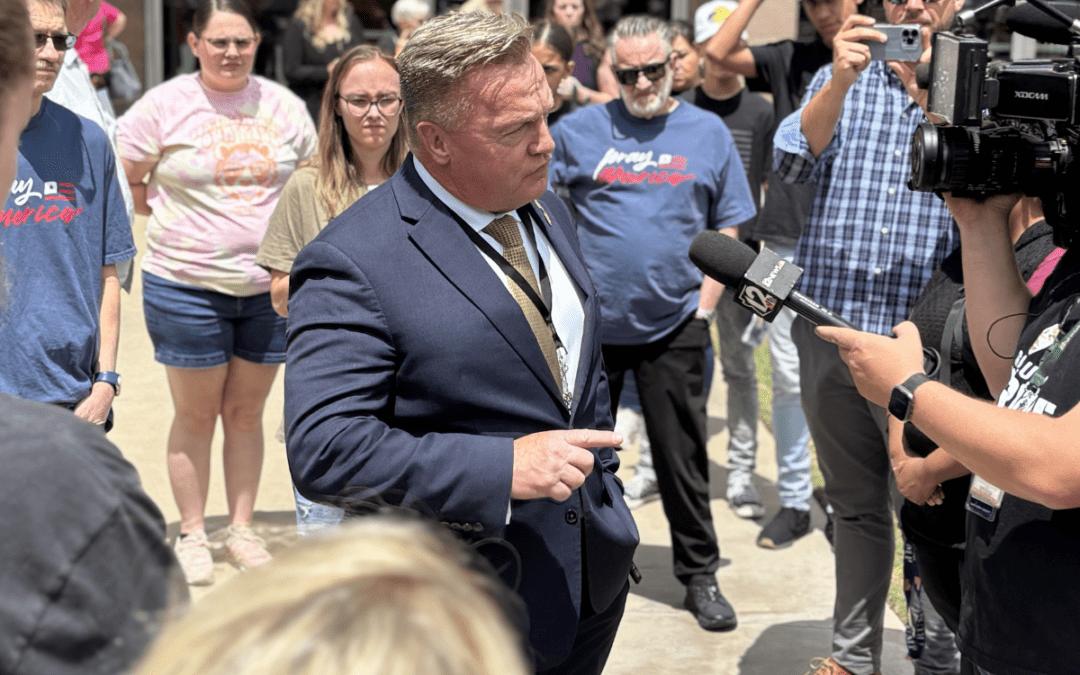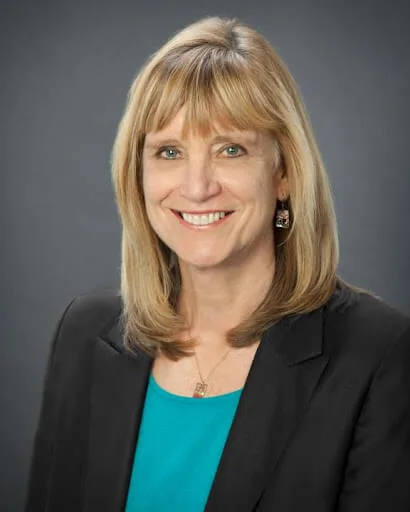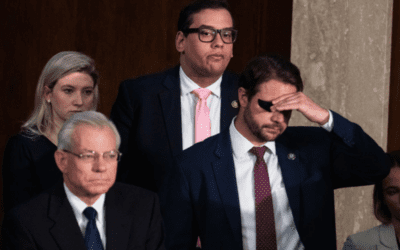
Caroline Maloney stands outside HonorHealth's Scottsdale Osborn Medical Center at the end of her overnight shift. AP Photo/Matt Yor
The news was about as bad as it could get.
Due to a chromosomal abnormality, Alana’s* desperately longed-for pregnancy was in trouble. If she went to term—which was unlikely—her baby’s life would be measured in minutes, perhaps hours.
Devastated, Alana and her family made the wrenching decision to terminate.
And then, things got worse: because Arizona currently bans abortions after 15 weeks of pregnancy, Alana would have to travel out of state to get this medically indicated procedure.
Harder to provide necessary care
This is the state of reproductive health care in Arizona right now. An even more draconian law—one that outlaws abortions from conception forward, with an exception only to save the life of the mother—is wending its way through the courts, creating even more fear and uncertainty.
“Like most doctors, I went to medical school to help people,” said Dr. Laura Mercer, associate professor of Obstetrics and Gynecology at the University of Arizona College of Medicine in Phoenix. “It is heartbreaking not to be able to provide the best care to my patients.”
Mercer, who is also Alana’s physician, has another worry: the future supply of physicians in the state. According to an April 2023 study by the American Association of Medical Colleges, applications for residency programs—the two to seven years of advanced training that medical school graduates must complete to practice in their specialties—have dropped in states that have abortion bans.
@coppercourier Arizona’s abortion laws are so strict, doctors don’t want to work here. . . . . . . . . . . azabortion azleg azpol katiehobbs azlegislature safeabortions abortionsarehealthcare azdoctors azhealthcare healthyliving fyp
Unintended consequences
Katharine O’Neill, a fourth-year medical student at the University of Arizona College of Medicine in Phoenix, is exploring which OB-GYN residency program she will attend when she graduates next spring. Arizona is a place she’d like to stay because she has family here. But the abortion laws are working against it.
While attending a seminar on residency programs in states with restrictive abortion laws, O’Neill was told that in order to get proper training, residents would need to travel out of the state they were attending.
“The first question at the seminar I attended last week was, ‘how can I get my family planning rotation?’” O’Neill said. “The answer was, ‘You can get it, but you’ll have to leave the state for that.’ That’s not easy in the middle of your residency.”
Residents would need to spend a month or more away out of state, at their own expense, in order to be trained on certain aspects of reproductive healthcare. And even if medical schools figure out this kind of workaround, O’Neill said, conflicting laws surrounding abortion laws create long-term problems.
“What you need is attending physicians who finish their training, stay in the state, and practice there,” O’Neill added. “What you don’t want is for them to train at taxpayer expense, and then leave for New York or California because those places are more attractive for practicing medicine.”
Arizona’s medical brain drain
Physician shortages driven by abortion bans extend beyond OB-GYNs. Early indications show that aspiring doctors in internal medicine, family medicine, surgery, pediatrics, and anesthesiology are avoiding medical residencies in states with abortion bans and gestational limits.
While the majority of physicians practice where they complete their residencies, this bodes ill for medical care in Arizona, where medical students like O’Neill have been told they would need to leave the state in order to round out their training. And Arizona needs every physician they can get: in September 2023, the US Department of Health Services released findings that Arizona has 650 fewer primary care physicians than are needed to support its population.
“What it means is that every woman, man, and child in our state can expect worse health care,” says Mercer. “Especially if they happen to live in rural areas where the shortages are already acute.”
When providing healthcare becomes a crime
Mercer has already witnessed the talent drain—and she understands it.
“As a doctor, you end up second-guessing every medical decision through a legal lens; filling out a mountain of paperwork that serves no medical purpose; thinking twice about every word you write in a patient record,” Mercer said. “There is a very real fear that you might go to jail. Who on earth would choose a place like this to train and practice?”
O’Neill and her partner, who is seeking a medical residency in psychiatry, will likely make their choices based on which program accepts them both and where they have family—even if it means she has to periodically travel out of the state where her program is to get the training she needs.
Residency matching, she says, “is a beast” and may require that kind of compromise.
But she is worried about the future of her chosen vocation. What frustrates her most are uninformed assumptions that abortion is an easy, black-and-white choice.
A medical decision, not a legal one
Not long ago, she witnessed a difficult delivery of premature twins.
The first baby died within a minute or two of delivery; the second was in distress. The mother was technically stable at that moment, but an infection was brewing and her vital signs were deteriorating. As the team grappled with what to do, O’Neill said one physician turned to another and told them: “I agree with you medically. I just don’t want to have to meet with my attorney in the morning.”
“I wish everybody could spend 24 hours on a labor and delivery ward,” says O’Neill. “Nothing about these decisions is easy, for anybody involved. Too often, these laws are not saving lives. They are just prolonging really bad situations.”
Abortion advocates push to restore rights
Reproductive rights advocates in Arizona have taken steps to protect abortion access through the state constitution. The Arizona Abortion Access is a ballot initiative for a constitutional amendment that would bar any law restricting an individual’s access to abortion care before fetal viability—generally considered 23–24 weeks— without a “compelling state interest.”
@coppercourier Arizona abortion rights groups came together Thursday to announce that they would begin the monumental task of collecting over 500,000 signatures from voters in favor of protecting abortion access in the state constitution. Our video correspondent @playboymanbaby explains… To learn more, click the link in bio. . . . . . . #aznews #arizonanews #arizonapolitics #azpol #azleg
It also prohibits state interference after that point when a health care professional declares the procedure necessary for the mother’s physical or mental well-being.
To qualify for the November 2024 election, initiative organizers must gather 383,923 signatures—15 percent of the votes cast in the last gubernatorial election—but they say they will exceed 500,000 by the July 2024 deadline.
While it has been derailed by many in the state who oppose abortion care, the initiative has already received the support of a number of prominent Arizonans, including Gov. Katie Hobbs.
“I’ve repeatedly said that I do not believe the government or politicians should be in the business of making personal healthcare decisions,” Hobbs said in an emailed statement. “I’m confident that Arizonans will vote for reproductive freedom next November.”
Majority support reproductive freedom
Most Arizonans believe abortion should be legal in at least some cases. The Public Religion Research Institute, a nonpartisan organization, found in a 2022 poll that up to 62 percent of Arizonans support legalizing abortion in most or all cases.
A survey commissioned by NARAL Pro-Choice America, an abortion advocacy organization, found that 90 percent of Arizonans opposed government interference regarding their medical decisions. These numbers mirror national data, which indicate that most Americans support some access to abortion, especially in the first trimester.
“I respect that there are differences of opinion on this difficult issue,” says Mercer. “I also believe that reasonable people can hold different views and still find common ground. As we seek that ground, can we please stop the drain of medical talent away from our state? Can we not trample the individual freedoms we Arizonans are so fiercely proud of?”
As for Alana? She got good care elsewhere, through help and fundraising from her extended family, and support of her medical team. “I am grateful and relieved for that,” says Mercer. “But let’s be clear: abortion bans are bans only for those who cannot afford to travel. It’s so unjust.”
*Name has been changed to protect the individual’s privacy.

Arizona Sens. Anthony Kern, Jake Hoffman, indicted for fake election scheme
Eighteen individuals involved in a conspiracy to overturn Arizona’s election results in 2020 were indicted by a grand jury Wednesday and charged...

He said what? 10 things to know about RFK Jr.
The Kennedy family has long been considered “Democratic royalty.” But Robert F. Kennedy, Jr.—son of Robert F. Kennedy, who was assassinated while...

Opinion: Why hiring people with developmental disabilities is beneficial for business
Written by Todd Sanders, President and CEO of the Greater Phoenix Chamber, and Dawn Trapp, CEO of Civitan Foundation Inc. As we look back on...

Arizona expects to be back at the center of election attacks. Its officials are going on offense
Republican Richer and Democrat Fontes are taking more aggressive steps than ever to rebuild trust with voters, knock down disinformation, and...





